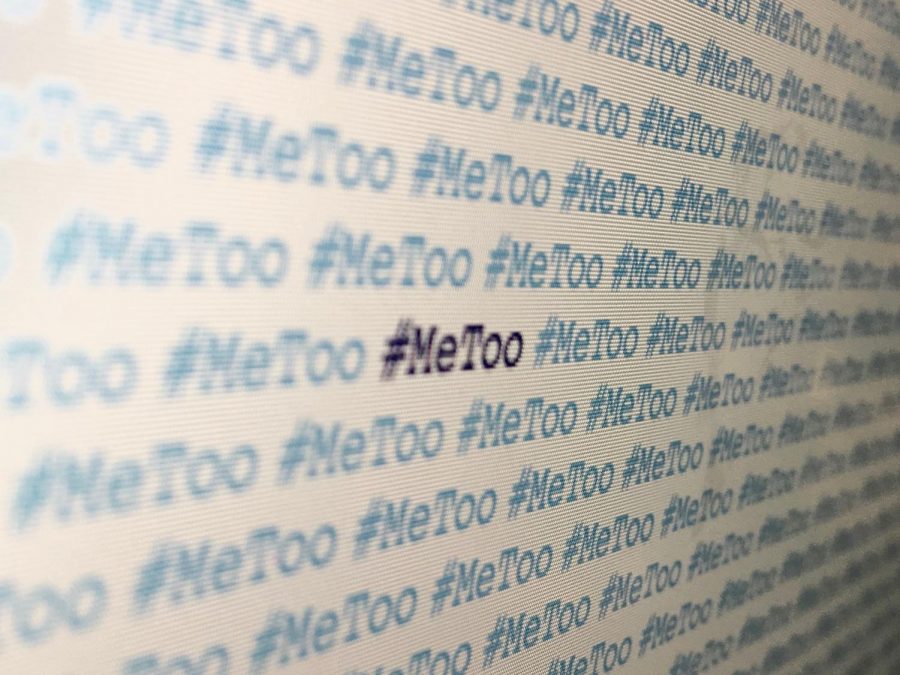Aziz Ansari, “Grace,” and #MeToo (Opinion)
Why “3000 words of Revenge Porn” deserves to be heard
January 18, 2018
A sea of black dresses at the recent Golden Globes served as a stark visible symbol for a nationwide awakening to the reality of sexual assault in the entertainment industry. Known as Time’s Up, the movement reflected the transcendence of #MeToo to Hollywood and a more public existence. While having been referred to as a witch hunt by a select few, little backlash compared to that which resulted from the account posted by Babe, chronicling one woman’s night gone wrong with Master of None’s Aziz Ansari. In the exposé, “Grace” details an evening that reflects many women’s modern associations with dating: sexual assault. As a response to the revelation, debate has arisen over the relevance of Ansari’s alleged guilt to the overall goal of #MeToo.
Shortly after the story was released, The Atlantic’s Caitlin Flanagan contributed her own ideas about the incident, noting the degree to which her age contributed to her lack of perspective. In a seething Op-Ed, Flanagan was one of the first in a series of writers ripping into both Babe and “Grace” for their role in Aziz Ansari’s “humiliation.” Comparing the events of the night to the plots of books and magazines she read growing up, Flanagan largely minimizes Grace’s claims, scoffing at the idea of Ansari’s actions being labelled as sexual assault and, in turn, reducing Grace’s experience to an unfortunate encounter. She resorts to victim-blaming, arguing that if uncomfortable, Grace could’ve simply called a cab and left Ansari’s apartment. Ultimately, she condemns #MeToo as a whole in feigning surprise at their attack on somebody other than a “college-educated white man” and classifying the movement as a group of women who are “angry and temporarily powerful.”
Flanagan wasn’t the only journalist to find problem with Grace’s claims. Bari Weiss of The New York Times shares a similar viewpoint. Weiss also believes that Grace’s leaving would have been an easy solution to the dilemma. She asserts that it is not the responsibility of men to be sensitive to signs of discomfort, but rather that it is the responsibility of women to be more verbal in their sexual experiences. She disagrees with the notion that consent is affirmative. She dissociates the encounter with the holistic movement, arguing that Ansari’s position didn’t reflect one of power over Grace, and that the moment was “far from anything approaching assault or rape.” Weiss concludes that Grace’s lack of empowerment in the moment reflected a weakening of women, an over dramatic response to “bad sex.”
What both Flanagan and Weiss fail to recognize, however, is the importance that a story like Grace’s holds in being shared. While the two writers believe Grace’s experience to be an overreaction, they misunderstand that her account is representative of a greater problem. A story like Grace’s is exactly what #MeToo needs: a wider societal acknowledgement of sexual assault. Sexual assault exists on a spectrum, but all symptoms are signs of a greater issue. Her inclusion of details, labelled as “humiliating” by Flanagan, reflect her thoughts in analyzing the event. The progression of the night from discomfort to assault allows for a glimpse into Grace’s acceptance of her violation. The details remind other women of their own similar experiences, exposing a cultural epidemic. The details tell a story that “no means no,” and that no degree of sexual assault is permissible.
Grace’s story is significant for other reasons as well. Grace was eager to go out on a date with Ansari, but this did not imply that she wanted to have sex with him. She consensually went to his apartment after dinner, but this did not mean that sex was expected. Ansari’s, Weiss’s, and Flanagan’s inability to recognize Ansari’s actions as more than just bad sex signifies a bigger problem. In admitting his “misinterpretation” of the evening, Ansari reveals that our society still does not comprehend the concept of consent. Even then, misinterpretation does not excuse assault, just as being unaware of the speed limit does not excuse going 50 in a 30. Furthermore, distancing less overt examples of sexual assault from public interest dangerously ignores the problem at hand. Differentiating between degrees of assault normalizes the very culture that invites rape in the first place.
In that regard, the exposé fits the Time’s Up and #MeToo narratives perfectly. In identifying Ansari, it ends the era of granting those in power a free pass. In exposing a well-liked, popular figure, it legitimizes the campaigns by refusing to excuse even those in solidarity with the movement. In telling the story of a sexual encounter that lacked consent, it expands the national conversation to that which highlights America’s broken sexual culture. Society’s choice now stands at qualifying sexual assault, or choosing to address the issue as a whole. Flanagan did, however, manage to make one accurate assertion: women of our generation are both angry and very, very powerful.

